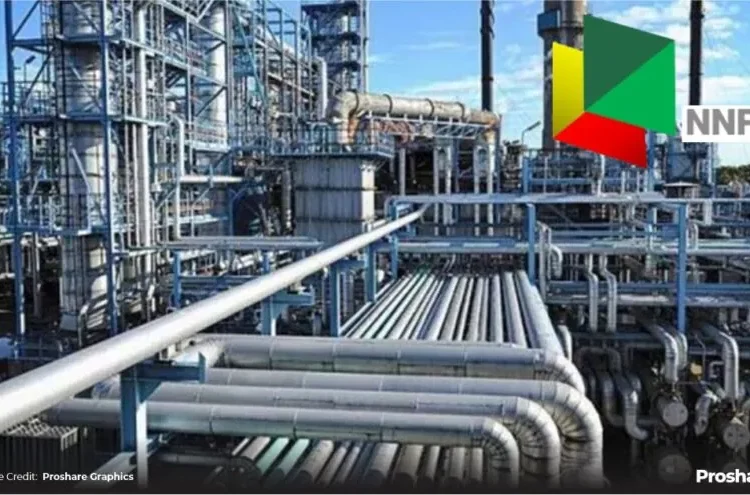Stakeholders in the country’s oil and gas sector have disagreed with the Nigerian National Petroleum Company Limited (NNPCL) on its decision not to sell the Port Harcourt Refining Company (PHRC), but to complete its high-grade rehabilitation and maintain national ownership.
NNPC Group CEO Bashir Ojulari announced at a town hall meeting in Abuja that ongoing technical and financial reviews of the Port Harcourt, Kaduna, and Warri refineries deem the sale of PHRC unlikely, warning that selling now would lead to further value erosion.
Despite NNPCL’s stance, various industry stakeholders continue to push for the sale or leasing of Nigeria’s refineries, citing persistent inefficiencies and financial burdens.
President of the Lagos Chamber of Commerce and Industry (LCCI), Gabriel Idahosa, insisted that “the government should consider selling or leasing all government-owned refineries to capable investors and create a favourable and competitive environment for private investment” to reduce dependency on refined petroleum imports.
Also, the managing director of DEEP Shore Energy, Nneka Zainabu Obi, argued for outright privatisation, blaming “the government’s lack of integrity in business management” for the refineries’ chronic underperformance.
LEADERSHIP’s checks show that the federal government has spent approximately N11.34 trillion on the rehabilitation of the country’s three major refineries—Port Harcourt, Warri, and Kaduna—over the last decade from 2010 to 2020.
This figure includes costs for running and operating the refineries, rehabilitation projects, subsidy payments, and deductions from the Federation Account for rehabilitation purposes.
Additionally, the Federal Executive Council approved and initiated a $1.5 billion rehabilitation project for the Port Harcourt refinery in 2021, reflecting ongoing investments in refinery repairs.
Speaking during the town hall, Ojulari said, “Rather, it is informed by ongoing detailed technical and financial reviews of the Port Harcourt, Kaduna, and Warri refineries.”
According to him, the ongoing review indicates that the earlier decision to operate the Port Harcourt refinery before full completion of its rehabilitation was ill-informed and sub-commercial.
He said that although progress is being made on all three, the emerging outlook calls for more advanced technical partnerships to complete and improve the rehabilitation of the Port Harcourt refinery. Thus, selling is highly unlikely as it would lead to further value erosion.
The NNPC said the town hall served as more than a performance update-it was an opportunity for candid and constructive engagement.
The executive vice presidents presented progress reports from the Upstream, Downstream, Finance, Business Services, Gas, Power, and New Energy businesses, highlighting operational achievements, ongoing reforms, and areas requiring attention.
“The announcement reinforces NNPC’s mandate as a strategic custodian of national energy infrastructure and reflects a firm resolve to deliver the complete rehabilitation and long-term viability of Nigeria’s refineries. It also signals continuity in the federal government’s broader energy security objectives and a commitment to retaining critical assets under national control,” Ojulari said.
However, speaking to LEADERSHIP on the issue, Chinedu Ukadike, spokesperson of the Independent Petroleum Marketers Association of Nigeria (IPMAN), advocated for a Public-Private partnership to sustain the asset’s operations.
Ukadike suggested that a similar arrangement that has sustained the Port Harcourt Petrochemical Company in Port Harcourt should be adopted, where private companies with knowledge of petroleum refining are offered opportunities to invest in the refinery.
However, Mrs. Nneka Zainabu Obi, the managing director of DEEP Shore Energy, called for the outright privatisation of the public refineries, as the government lacks integrity in managing business.
Obi said private business operators always have a set of objectives and a succession plan to continue with their business legacy. However, different administrations come with their own agenda without properly defining what constitutes corporate governance in business operations, and as such, public assets continue to suffer neglect and abandonment.
The president of Lagos Chamber of Commerce and Industry (LCCI), Mr. Gabriel Idahosa, noted the declining global oil prices, inefficiency, and underperformance of government-owned refineries.
To address these, he said that the government should consider selling or leasing all government-owned refineries to capable investors and creating a favourable and competitive environment for private investment. The goal is to attract more investment in the oil refining space and reduce the importation of refined petroleum products further.
Also partner and chief economist at SPM Professionals, Dr. Paul Alaje, emphasised that government management of Nigeria’s refineries has consistently failed, despite substantial investments running into billions of dollars. He argued that although government’s role should center on public welfare, refining is a highly competitive industry better handled by the private sector.
“Now that fuel subsidies have been removed, there’s no sound economic rationale for the government to continue owning the refineries,” he noted.
He proposed two viable options: a full sale through a transparent, competitive bidding process, not one skewed in favour of political allies, and a public-private partnership in which the government maintains a minority stake, similar to the Nigeria LNG model.
Alaje cautioned, however, that any divestment must avoid the pitfalls of the PHCN privatisation, which led to underperforming distribution companies.
He insisted that potential buyers must meet three key conditions: the financial ability to purchase the assets, capacity to restart operations, and clear funding sources for acquisition and maintenance.
“We must avoid transferring these assets to entities lacking experience, only to create new challenges such as mass layoffs and government bailouts,” he warned.
Chief executive of the Centre for the Promotion of Private Enterprise, Dr. Muda Yusuf, also called for the outright sale of the refineries, stressing that transparency must be central to the process. He described the refineries as burdensome to both the federal government and the nation, pointing out that billions spent on their upkeep have yielded no results.
Yusuf further explained that the government had even used forward crude oil sales to fund refinery maintenance, an arrangement that has failed to generate meaningful returns and has limited the inflow of revenue into the Federation Account.
“These refineries have become major financial drains. If something no longer adds value, it’s best to let it go, even at no cost, provided the new owners commit to restoring it with their own resources. What matters most is that the process is open and accountable,” he added.
Adding his voice, Zakari Mohammed, a financial economist at Auchi Polytechnic, criticised the repeated failures of past rehabilitation contracts. “After spending roughly $2.5 billion, the refineries still collapsed within months. It’s clear we need a new approach, transparent privatisation, possibly modelled after the Dangote example,” he said.
The chief executive of AntHill Concepts Limited, Dr. Emeka Okengwu, said the issue of concern should actually be the refineries being well-managed. He said if there is a management programme or the company decides to concession the refineries, then it isn’t necessary to sell them. “The government can actually get a good management or people who are equipped to run the refineries more efficiently,” he said.
For his part, former Interior Minister, and chairman Integrated Oil and Gas Limited, Capt. Emmanuel Iheanacho, said the company had the required resources and is currently managed by technocrats who understand core business operations in the industry, and should not be confused about business ethics.
Iheanacho said the Company should not be seen entirely as a government entity because it has the status of a CAMA company, run independently without perceived government influence.
For its part, the Crude Oil Refinery-owners Association of Nigeria (CORAN) has called for the concession of the refineries, given that the NNPCL has completely transitioned into a limited liability company.
According to a spokesperson of the Association, Eche Idoko, “With the benefit of hindsight, refinery business is best run by private and commercially minded hands.
“With NNPC transiting to a limited liability company, one may argue hat they are better positioned than they were few years ago to run a refinery but given that the transition is still ongoing it is not a bad idea to consider concessions or divestment in the ownership provided due and transparent process is followed and the mistakes made in the sale of the power assets are not repeated. ”





